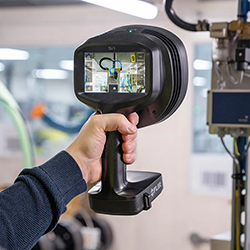Reimagined Supply Chains Emerge From Global Crisis as Enterprises Focus on Data Insights to Mitigate Risk
-Orange survey highlights opportunities to future-proof supply chains -Success will depend on real-time data insights, agility and digitalization
New research from Orange Business Services found that the supply chains in 40% of multinational corporations were unable to cope with the crisis created by the pandemic. The survey of 320 enterprises, focusing on the manufacturing, transport and logistics sectors, revealed that the global crisis has dramatically changed attitudes to risk.
Some 83% of respondents said they are more aware of supply chain risks, such as raw material shortages, manufacturing shutdowns, or transport blockages, than twelve months ago. The pandemic has woken them up and made them realize they need more speed, agility and innovation to cope with change. Building resilience and sustainability into supply chains through digitalization and real-time data insights is a priority for transformation strategies and essential to the survival of many companies.
Reinforcing the supply chain
Nearly eight in 10 say they have accelerated their digital supply chain strategies. In addition, almost 50% of companies surveyed said they are now looking at overhauling risk procurement and risk management strategies within the next two years. Automation is also set to increase in prominence to handle rapidly changing demand levels. Currently 42% of enterprises surveyed say they are using automation to manage risks, and this will double over the next two years.
Two out of five respondents to the survey said their supply chain could not cope at the height of the crisis. Technological enablers, including artificial intelligence (AI), cloud, 5G and big data analytics will now play important roles in strengthening supply chains through enhanced planning and execution. Collecting and sharing real-time data will improve efficiencies and visibility across the entire supply chain, while supporting relationships between suppliers and manufacturers for smart decision making.
"The global health emergency has made organizations accept the fragility of their ecosystems. Critical gaps must be plugged to ensure end-to-end visibility on a global scale and minimize the risk to the business. Digital technologies and capabilities are the key in allowing enterprises and their partners to reimagine their supply chain securely," said Kristof Symons, executive vice president, International, Orange Business Services. "Digitalization and data collection will also be primary enablers to become more sustainable and save costs as well as the planet," added Symons.
Reenergizing sustainability programs
Although the crisis has pushed sustainability down the corporate agenda, the survey still had 59% of respondents saying that not running an ethical and sustainable business was a significant business risk affecting their bottom line. Smart factories can realize a 30% saving in energy costs, for example.
Moving forward, 85% of respondents said their business is investing to become more sustainable. This includes new data collection technologies to give better insight into sustainability metrics and managing and controlling factors such as energy usage.
"The pandemic will stop, somehow. But climate change, sustainability - those trends and risks are here for the next few decades," explains Erwin Verstraelen, CDO and CIO at the Port of Antwerp. "For example, The European Green Deal is going to put more pressure on all stakeholders to identify the origins of emissions and minimize their environmental footprint. The supply chain is an important element of that."
If actions by organizations follow their ambition, digitally-driven sustainability management programs will become near universal within two years.
The report, Real-time Intelligence and the Future of Supply Chains surveyed 320 senior executives from multinationals across 18 countries between August and October 2020. The survey was carried out for Orange Business Services by independent research group Longitude, a Financial Times company.
About Orange Business Services
Orange Business Services is a network-native digital services company and the global enterprise division of the Orange Group. It connects, protects and innovates for enterprises around the world to support sustainable business growth. Leveraging its connectivity and system integration expertise throughout the digital value chain, Orange Business Services is well placed to support global businesses in areas such as software-defined networks, multi-cloud services, Data and AI, smart mobility services, and cybersecurity. It securely accompanies enterprises across every stage of the data lifecycle end-to-end, from collection, transport, storage and processing to analysis and sharing.
With companies thriving on innovation, Orange Business Services places its customers at the heart of an open collaborative ecosystem. This includes its 27,000 employees, the assets and expertise of the Orange Group, its technology and business partners, and a pool of finely selected start-ups. More than 3,000 multinational enterprises, as well as two million professionals, companies and local communities in France, put their trust in Orange Business Services. For more information, visit www.orange-business.com or follow us on LinkedIn, Twitter and our blogs.
Orange is one of the world's leading telecommunications operators with revenues of 42 billion euros in 2019 and 257 million customers worldwide at 30 September 2020. Orange is listed on the Euronext Paris (ORA) and on the New York Stock Exchange (ORAN). In December 2019, Orange presented its new "Engage 2025" strategic plan, guided by social and environmental accountability. While accelerating in growth areas, such as B-to-B services and placing data and AI at the heart of innovation, the entire Orange Group will be an attractive and responsible employer.
Orange and any other Orange product or service names included in this material are trademarks of Orange or Orange Brand Services Limited.
Featured Product

Affordable Excellence: The Go-To Tool for Finding Compressed Air Leaks
Find compressed air leaks fast with FLIR's new cutting-edge Si1-LD acoustic imaging camera. Leveraging advanced ultrasonic technology and onboard analytics, this affordable camera pinpoints leaks and quantifies incurred losses even in the nosiest environments. Upgrade your maintenance routine with the cost-effective FLIR Si1-LD - significantly reduce energy costs and increase system uptime. Get Started Today.
